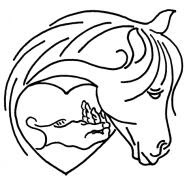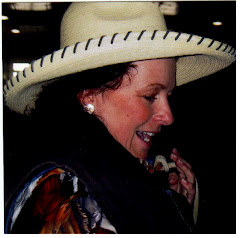In the July newsletter we talked about "Revealing the Truth Within". We suggested how to tap into the potential of both the horse and rider in order to release their "imprisoned splendor". In order to "Reveal the Truth Within" we must first crack through any defensive behaviors, open the mind to new information, listen to different points of view, and be willing to look for and try new ways of doing things.
We must first be able to recognize defensive behavior before we can deal with them. The main cause of defensive behavior for most people stems from the fear of making mistakes, being wrong, feeling stupid or looking incompetent. Because a person doesn't want to look bad they tend to blame the horse when things are not going well. When a human feels he has to defend "being right" they often replace calm, confident leadership with anger, frustration, or stronger unfair tactics towards the horse. The human gets sucked into a win/lose battle with the horse instead of being flexible and changing until they find a better way to communicate with the horse.
Another way humans express defensive behavior is through feeling superior to others or to the horse. The most effective horsemen are humble and we often hear them say things like:
"horses are still teaching me",
"I still have a lot to learn",
"the more I know the more I realize I don't know",
"I love being a student and I'm still working on getting it all right",
"I just can't get enough of this", and
"I owe some horses apologies for my past ignorance".
On the opposite end of the spectrum their are some horse people who tend to give out unsolicited advice and are quick to dismiss other people, ideas or examples of horsemanship which don't fit into their point of view. The entire horse industry is notorious for surviving on more opinion than fact and feelings of superiority.
The failure rate of new horse owners who end up getting out of horses altogether, and the number of throw away horses deemed as unusable are proof that we are far from working in harmony with our equine friends. Once we are able to accept our mistakes and our shortcomings we will be able to let go of our defensive behaviors and become better horseman for our horses.
If we ask the question "why am I getting the results I am getting?" we will begin to understand the horse is just giving us feedback and an honest opinion. When we throw away the useless idea that mistakes are somehow bad we can begin to learn more useful and effective principles which will result in rapid positive progress. Every mistake we make brings us closer to harmony with horses if we are willing to learn from them. Remember in horsemanship it is rare when things are "right or wrong", "good or bad". Everything is either appropriate for the situation and useful to our goals or not.
When we feel like saying, "That dumb horse!" remember we may be the one making a mistake. Instead we should say "Wow, that didn't work, I wonder how I could present it in a different way in order to get a better outcome?". By recongnizing we have a role in the horse's response, and acknowledging our mistakes we will break down defensive barriers instead of building them. When the defensive barriers are gone we will be able to see more clearly where the horse is having trouble and then come up with creative solutions to all of our problems.
With a perspective of responsibility for the outcomes and responses a horse gives us, an attitude of humility, and accepting mistakes as learning opportunities, instead of having a defensive behavior where everything is either right/wrong or good/bad a horseman can begin to see new solutions to old problems. By recognizing our defensive behaviors and replacing them with positive progressive knowledge and self-control the relationship with our horses will develop into a partnership where dreams will be realized.
Stay tuned because next month we will discuss defensive behaviors of the horse.
Happy Trails,
sherry
Wednesday, August 27, 2008
Subscribe to:
Post Comments (Atom)













No comments:
Post a Comment